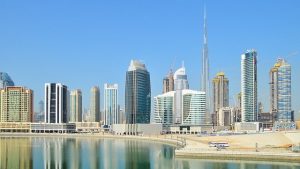Thinking of starting a business somewhere new? If you want the buzz of being around other successful people, in a modern city, with beautiful beaches within walking distance of your home and office, you need to consider Dubai.
Dubai is becoming a major business centre – as the UAE start to encourage economic growth in other areas outside of gas and oil, they’re doing all they can to encourage entrepreneurs like you to develop your business in Dubai.
The UAE has some of the most business-friendly tax structures in the world and is one of the only modern and wealthy countries in the world to offer 0% personal income tax. So, if Dubai has won you over, as it has so many before you, how do you set up your business there?
What You Need to Know Before Setting Up Your Business in Dubai
What are Dubai’s free zones?
The UAE offers free zones where foreigners can set up their own businesses and retain 100% ownership of them. At the time of writing (July 2022), businesses formed in a free zone are also not subject to taxes. The limitation of forming in a free zone is you cannot do business directly with the local UAE market. There are over 45 free zones, each with its own benefits. In Dubai, the most popular free zones are:
- IFZA Dubai – our preferred free zone; it’s forward-thinking, modern, and offers some of the best benefits for the widest range of businesses. You can combine both trade and service licenses.
- DMCC (Dubai Multi Commodities Center) – a popular choice for businesses in the financial or commodities sector.
- DWC (Dubai World Central) – A key free zone for logistics and aviation companies.
- JAFZA (Jebel Ali Free Zone Authority) – A popular choice for importers and exporters.
- DAFZA (Dubai Airport Free Zone Authority) – A popular choice for businesses that need easy access to Africa, Asia, Europe, and the Middle East.
Do I need a sponsor to start a company in Dubai?
No, not if you’re setting up in a free zone. Provided you’re setting up in a free zone, you can retain 100% ownership.
What type of legal entities are there?
There are two types of legal entities you can set up in a free zone:
- A Free Zone Limited Company (FZ LLC) or Free Zone Company (FZ Co.)
- Free Zone Establishment (FZE)
Most people choose to form a FZ LLC due to its beneficial legal structure, and not all free zones allow all legal structures. Existing companies can set up a branch of their company within a free zone.
Is there a minimum capital requirement?
Some free zones have a minimum capital requirement. This varies from as little as AED 1,000 (about $270) to AED 1M ($270,000). IFZA Dubai has no minimum capital requirement, which is one of the reasons we recommend it.
How to Set Up a Company in Dubai in 8 Steps
Step 1: Decide on the free zone
There are many free zones in Dubai, so your first step should be to decide which free zone will be best for you and your company. Each offers slightly different benefits, but generally, we recommend IFZA Dubai. IFZA is one of the most forward-thinking free zones with good support for businesses.
Step 2: Choose your license
There are three different types of business licenses to choose from:
- A commercial license – for businesses that buy and sell goods, as well as those that import and export, are in logistics, sales, real estate, and travel and tourism. This is the most common type of business license.
- An industrial license – for businesses engaged in manufacturing.
- A professional license – for businesses providing services or consulting.
Step 3: Define your business activity
Once you know what kind of license you need, you need to define your business activity. There are over 2,100 different business activities to choose from, so it can be a little overwhelming! There’s a full list on the website here, but it’s often a good idea to get advice from a consultant to ensure you select the right one, as a mistake can cause issues down the road.
Step 4: Choose your name
Your next step is to choose your business name. This step is straightforward, you just need to make sure your name is not already in use and cannot be perceived as being offensive to, tied to, or referring to political groups or religious groups. If it’s named after someone, they must be a partner or owner of the business and you cannot use initials or abbreviations. Again, if you’re not sure, consulting an expert can ensure you don’t make any mistakes.
Step 5: Set up your office
All businesses in Dubai must have a physical address, but the good news is forming in a free zone makes this easy. All free zones provide office space for the businesses registered with them, so you’ll be able to find an office to lease that meets your needs. Some free zones cater better to certain types of businesses than others. IFZA provides shared office spaces as well as offices to rent, so it’s a good choice for businesses of all sizes.
Step 6: Apply for initial approval
The next step is to apply for initial approval – this is where the Dubai DED checks that they have no reason to object to your registering a business in Dubai. The documents required do depend some on what your business will do, but generally you’ll need:
- Your completed application form
- A copy of your passport (needs to be in colour)
- Signature(s) of the company shareholder(s) and the manager or director
- A business plan
- Proof of your business premises (such as a unit title deed)
- A letter of intent
- Registry Identification Code Form (RIC) for the manager or director
If you plan to be a freelancer operating out of a free zone, you need fewer documents, usually just your application form, CV, bank reference letter, and RIC. If you need help correctly compiling these documents, we’re here to help.
Step 7: Open a bank account
Once you’ve been approved, it’s time to apply for a corporate bank account. This can be a complicated process, but one of the reasons we recommend IFZA Dubai is they supply all new businesses with a list of banks that make it easy for foreigners to open a corporate bank account with them.
Step 8: Apply for final approval
Once you’ve got your office space and bank account, you can submit all your information for final approval and pay your registration fees. In most cases, you need to submit:
- Your completed registration application form
- Power of attorney given to the manager or director
- Board resolution appointing the manager or director
- Memorandum and articles of association
- Specimen signature of the manager or director
- Passport-size photo of manager or director (must be a passport-appropriate photo)
- Share capital information
You’ll then be given your trade license and lease agreements, and you can start the visa process.
How much does it cost to set up a company in Dubai?
In most cases, it costs 15,000-25,000 AED for your company formation in Dubai, which is approximately $4,000 to $6,800 USD. Some free zones have capital requirements.
How long does it take to set up a company in Dubai?
It takes around 10 days to complete the company formation process, and it usually takes a further 5 working days to complete the visa process. Once complete, you are free to conduct business in the free zone and can sponsor your family to join you.
Is forming a business in Dubai difficult?
As you can see after reading the 8 steps above, forming a business in Dubai is a fairly straightforward process – it’s just a case of following the steps and ticking all the boxes. That said, knowing what boxes to tick can be much more complicated, and there are many steps that make the process more complex.
For this reason, it is difficult to figure it out on your own. For things to move smoothly, it’s best to work with a company that has plenty of experience in helping businesses form in Dubai. We help entrepreneurs set up their businesses in Dubai without complication or stress. We’ll help you get things right the first time and make the move to Dubai to start this new exciting chapter of your life.
To find out more about how we can help, or to start the process, click here.












